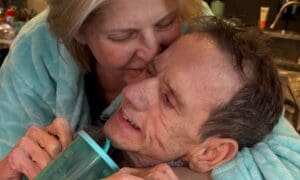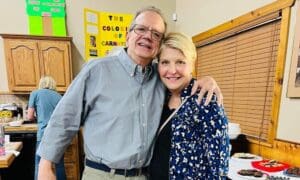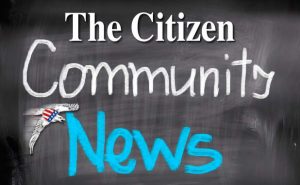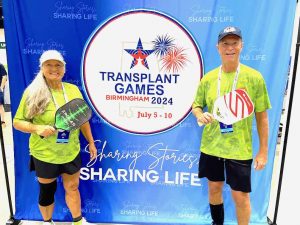Millions of people are visually impaired or legally blind. Low Vision services can help maximize independence at work, at home and in the community.
As an eye doctor, Dr. John Henahan of Spectrum Eyecare in Peachtree City is usually in the position of teaching others about their health and vision.
“Sometimes a patient becomes your teacher regarding aspects of the system of services for eye care and as an example of how people can thrive despite devastating visual disability. Audrey Demmitt, RN is one of those people. “ She is someone I am glad to know, honored to care for and in awe of,” said Dr. Henahan. “I have worked with thousands of visually impaired patients, and Audrey is truly unique, especially in her outlook and her commitment to maximizing independence for herself and others.”
Demmitt is the longtime school nurse at JC Booth Middle School in Peachtree City. In 1985 she was diagnosed with Retinitis Pigmentosa, a rare genetic disease that gradually destroys the receptors in the retina. This causes a gradual erosion of the peripheral vision until, just a small central spot of vision remains. Imagine looking into a room through a small keyhole, instead of opening the door and walking into that room. That will give you a good feel for how patients with advanced retinitis pigmentosa see.
Rather than allow her visual disability to sideline her from life, Demmitt worked tirelessly as her own advocate. She communicated with several state agencies that work with the visually impaired to keep them employed, only to be told that she would not be eligible, because she earned too much in her job.
The irony of this was not lost on Audrey. With the assistance of Dr. Henahan, she reached out to a non-profit agency called Vision Rehabilitation Services (VRS). Through VRS she was introduced to a program that provided her with adaptations that allowed her to keep her job and techniques to safely move through space. Recently she got
Sophie, a beautiful golden retriever dog guide.
The process of obtaining services taught Audrey how underserved the visually impaired are, especially in Fayette and Coweta counties. As a result of her experiences, VRS has hired Audrey to expand awareness of the services available to our community. Here are Audrey’s top tips for maximizing independence for those with vision impairment or legal blindness:
1) There are two main agencies in the Atlanta area: the Center for Visually Impaired (CVI) and Vision Rehabilitation Services (VRS). CVI is a center-based agency where clients are seen in the midtown Atlanta offices. If you are working or unable to get transportation, CVI cannot work with you. VRS is an agency that travels to the client and sees them in their home or place of work to teach assistive technology, how to move safely through an environment and daily living tasks (such as cooking, etc)
2) Open yourself to new technology. “Technology is my window to the world” said Audrey. “I recently got an iPhone 4S with Siri, a voice activated assistant that helps me access email, text messaging and the internet with my voice”. Apple is a technology leader in accessibility and recipient of the Dr. Jacob Bolotin Award from the National Federation of the Blind for innovative work in accessibility. Learn more at apple.com/accessibility/.
3) Be persistent and advocate for yourself or your family member. Seek support from the blind and visually impaired community. To facilitate that, Audrey is leading a VRS initiative to establish a local support and advocacy group right here in Fayette County. That program will assist visually impaired in getting services as well as allowing members to collaborate with each other and share learning experiences.
4) Always optimize lighting and contrast. Use such things as Ott lighting, colored cutting boards for contrast, labeling dials, knobs and buttons on appliances with tactile markers to help with low vision around the house. VRS has a host of additional strategies that they can teach you in your home to reduce frustration and maximize independence.
VRS also works with retirees to maximize their independence with in-home training. Ask them about Project Independence for seniors.
Where should you start if you (or a family member) are visually impaired? According to Dr. Henahan the best place to start is with an eye examination, especially if you have not had one in the past year or more. Establishing the current level of visual function is a precursor to obtaining services from VRS. Also, you want to check and see if new treatments are available that might restore visual function for the specific type of vision loss. Based upon that, VRS can provide a low vision evaluation that will guide the development of a plan to help each individual reach their goals for independence.
Attend an event on visual impairment. The Foundation Fighting Blindness in partnership with the Lions Club of Georgia is hosting an event on February 4 at 11 a.m. at St. Joseph’s Hospital. This event will feature the acclaimed documentary Going Blind- Coming Out of the Dark About Vision Loss. The film will be followed by a Q&A session. For more information call (770) 509-8363.
Dr. Henahan is the former director of Low Vision Services at LSU Eye Center in New Orleans, LA. He and his family live in Peachtree City, and he is the founder of Spectrum Eyecare. If you would like more information, you may contact Dr. Henahan at 770-487-0667 or VRS at 770-432-7280.












Leave a Comment
You must be logged in to post a comment.